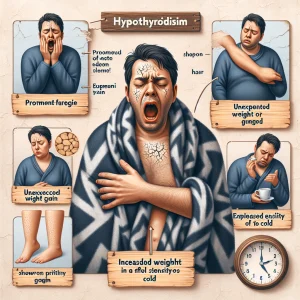Identify and Understand the Essential Signs and Symptoms of Hypothyroidism
Hypothyroidism is a serious health condition where the thyroid gland fails to produce adequate amounts of vital thyroid hormones. This butterfly-shaped gland, situated at the front of the neck, is integral to controlling a wide array of bodily functions, including metabolism, energy levels, and general well-being. An underactive thyroid can trigger a series of physiological changes that impact nearly every system in the body. The two main hormones—thyroxine (T4) and triiodothyronine (T3)—are essential for maintaining a healthy metabolic rate. When their production dwindles, individuals often experience significant drops in energy, weight fluctuations, and a decline in overall health, highlighting the necessity of recognizing and comprehensively understanding the broad-reaching effects of this condition.
Multiple factors can lead to the development of hypothyroidism, including autoimmune diseases like Hashimoto’s thyroiditis, certain medications, previous radiation treatments, and even insufficient iodine intake in the diet. It’s crucial to be aware of the risk factors and symptoms associated with hypothyroidism, as this condition can greatly impact both health and quality of life. Often dubbed the body’s “metabolic engine,” a slowdown in thyroid function can create metabolic imbalances that result in weight gain, persistent fatigue, and a multitude of other challenging symptoms. This condition is particularly prevalent among women and tends to increase with age. By familiarizing yourself with these signs and symptoms, you can seek timely medical attention and explore suitable treatment options.
Valuable Insights and Key Facts About Hypothyroidism
- Hypothyroidism is characterized by insufficient hormone production from the thyroid gland, leading to a diverse range of physical and psychological symptoms.
- Common indicators of hypothyroidism include fatigue, weight gain, dry skin, and heightened sensitivity to cold, among others.
- Physical symptoms may also consist of hair loss, joint pain, and muscular weakness, all of which can significantly impact daily activities and lifestyle.
- Emotional and psychological effects can include depression, anxiety, and difficulties in concentration, which may adversely influence mental health.
- Detecting hypothyroidism in children and adolescents can be particularly tricky, as they might show signs like growth delays, delayed puberty, or struggles in academic performance.
- Diagnosis generally relies on blood tests that evaluate levels of thyroid hormones and thyroid-stimulating hormone (TSH).
- The typical treatment for hypothyroidism usually involves synthetic thyroid hormone medications designed to compensate for inadequate hormone production.
- Implementing lifestyle changes such as following a balanced diet, engaging in regular physical activity, practicing effective stress management techniques, and ensuring adequate sleep can significantly improve the management of hypothyroidism.
 Recognizing Common Signs of Hypothyroidism in Daily Activities
Recognizing Common Signs of Hypothyroidism in Daily Activities
As you navigate through your daily life, you may encounter various symptoms that could signal an underactive thyroid. A frequent complaint from individuals with hypothyroidism is an overwhelming sense of fatigue. Many report feeling excessively tired, even after a full night’s sleep, which can sap motivation and hinder the completion of daily tasks. This persistent exhaustion affects physical health, emotional stability, and overall productivity, resulting in feelings of frustration and potential health complications over time.
Alongside fatigue, unexpected weight gain is another common symptom. Many individuals notice an increase in body weight despite adhering to a healthy diet and maintaining an exercise regimen. This frustrating weight gain typically arises from a slowed metabolism due to reduced thyroid hormone levels. Other associated symptoms may include increased sensitivity to cold, dry skin, hair loss, and constipation. Recognizing these early warning signs is crucial, as it allows for prompt medical intervention and effective management of the condition.
Delving into the Physical Symptoms Related to Hypothyroidism
The physical symptoms associated with hypothyroidism can vary significantly and can drastically impact daily life. One common indicator is a noticeable change in skin and hair health. Many individuals report experiencing dry, rough, and flaky skin that can be uncomfortable and irritating. Hair may also become brittle and fall out more easily, leading to concerns about personal appearance and self-esteem, which can further affect mental health.
Another physical symptom to watch for is myxedema, which manifests as swelling, particularly around the face or eyes. This condition results from the accumulation of mucopolysaccharides in the skin, leading to a puffy appearance that can be distressing. Muscle weakness and joint discomfort are also prevalent complaints among those diagnosed with hypothyroidism. Discomfort and stiffness in muscles and joints can limit participation in previously enjoyed activities. Thus, recognizing these physical signs is essential for understanding the broader implications of hypothyroidism on your body and overall quality of life.
Investigating the Emotional and Mental Health Impacts of Hypothyroidism
Hypothyroidism not only affects physical health but also has significant repercussions on emotional and mental well-being. Many individuals grappling with this condition often experience feelings of depression or heightened anxiety that appear disproportionate to their life circumstances. You may find yourself battling persistent sadness or a lack of motivation without any identifiable cause. If these feelings linger, they can become particularly troubling and indicative of the condition’s deeper implications for mental health.
Cognitive functions are frequently affected as well, with numerous individuals reporting experiences often described as “brain fog.” This cognitive decline manifests as trouble concentrating, forgetfulness, and a pervasive sense of mental sluggishness. These issues can disrupt daily responsibilities, making it increasingly challenging to tackle tasks at work and home. Understanding these emotional and cognitive symptoms related to hypothyroidism is vital for seeking the appropriate support and treatment necessary to improve your overall quality of life.
 Detecting Hypothyroidism Symptoms in Children and Adolescents
Detecting Hypothyroidism Symptoms in Children and Adolescents
Hypothyroidism affects not only adults but also has significant implications for children and adolescents, often presenting differently than in adults. In younger individuals, symptoms might not always be immediately identifiable. For instance, you may observe signs such as growth delays or difficulties focusing in school. These indicators can easily be mistaken for typical childhood behavior or common developmental delays, making it essential for parents and guardians to remain vigilant and proactive.
In addition to growth-related concerns, children diagnosed with hypothyroidism may experience excessive fatigue or lethargy, which can drastically impede their participation in physical activities and social interactions with peers. Mood swings and irritability are often observed as well, as hormonal imbalances can disrupt emotional regulation. If you suspect your child is displaying symptoms indicative of hypothyroidism, it is crucial to consult with a healthcare professional for a thorough evaluation and testing to ensure their health and developmental progress are being appropriately monitored.
Understanding the Vital Role of Thyroid Function Tests in Diagnosing Hypothyroidism
The Essential Importance of Thyroid Function Tests in Diagnosing Hypothyroidism
The journey toward diagnosing hypothyroidism typically begins with thyroid function tests, which are indispensable in assessing the overall health of your thyroid gland. The most commonly performed tests evaluate levels of Thyroid-Stimulating Hormone (TSH) and free thyroxine (T4). The pituitary gland produces TSH, which is crucial for signaling the thyroid to generate T4. Elevated TSH levels may indicate that the thyroid is underactive and struggling to produce sufficient hormones, suggesting the presence of hypothyroidism.
Deciphering Thyroid Test Results for Accurate Diagnosis
Simultaneously assessing T4 levels is critical for determining the severity of hormonal deficiency. When blood tests reveal elevated TSH levels along with low T4 levels, this combination typically confirms a diagnosis of hypothyroidism. Understanding the nuances of these tests can help alleviate concerns and provide clarity regarding your thyroid health, empowering you to take informed steps toward effective treatment.
Empowering Yourself Through Knowledge of the Diagnostic Process
Enhancing your understanding of the diagnostic process not only broadens your knowledge but also empowers you as you navigate your health journey. Being informed about how thyroid function tests operate and what they reveal about your body fosters more effective discussions with your healthcare provider, enabling proactive management of your health and well-being.
 Comprehensive Treatment Strategies for Effectively Managing Hypothyroidism
Comprehensive Treatment Strategies for Effectively Managing Hypothyroidism
Upon receiving a diagnosis of hypothyroidism, numerous treatment options become available to help you manage the condition effectively. The most widely adopted approach is hormone replacement therapy, which typically involves synthetic levothyroxine. This medication is designed to mimic the natural functions of thyroid hormones, aiding in the restoration of normal hormone levels, alleviating symptoms, and improving overall well-being.
Your healthcare provider will collaborate closely with you to determine the appropriate dosage tailored to your unique needs and how your body responds to treatment. Regular monitoring through blood tests is essential to ensure that your hormone levels stay within the target range. Maintaining open communication with your healthcare team regarding any changes in your symptoms or potential side effects is crucial for optimizing your treatment experience and achieving the best health outcomes possible.
Incorporating Lifestyle Modifications for Optimal Hypothyroidism Management
In addition to medication, implementing specific lifestyle changes can significantly enhance your ability to manage hypothyroidism effectively. A well-rounded diet focused on whole foods can be advantageous for supporting thyroid function and overall health. Incorporating foods rich in iodine, selenium, and zinc—such as fish, nuts, seeds, and leafy greens—can provide essential nutrients vital for optimal thyroid performance and hormone production.
Moreover, engaging in regular physical activity is crucial for maintaining a healthy weight and boosting energy levels. Moderate exercise can help combat fatigue, elevate mood, and enhance cognitive function, thereby contributing to an overall sense of well-being. Prioritizing good sleep hygiene is equally important; aiming for 7-9 hours of quality sleep each night supports hormonal balance and overall health.
By gaining a deeper understanding of hypothyroidism and its impact on both physical and emotional health, you empower yourself to take charge of your well-being. With the right approach to diagnosis, consistent management, treatment options, and lifestyle modifications, you can navigate this condition with confidence. Remember, you are not alone on this journey; seeking support from healthcare professionals and loved ones can significantly enhance your path toward achieving optimal health.
Common Questions About Hypothyroidism
What are the most prevalent symptoms associated with hypothyroidism?
Some common symptoms linked to hypothyroidism include fatigue, weight gain, constipation, dry skin, hair loss, sensitivity to cold, muscle weakness, and depression.
Can hypothyroidism lead to irregularities in the menstrual cycle?
Yes, hypothyroidism can indeed cause changes in the menstrual cycle, presenting as irregular periods, heavy bleeding, or even missed periods altogether.
Is hair loss a frequent occurrence in individuals with hypothyroidism?
Hair loss is a common symptom of hypothyroidism, often manifesting as thinning hair, brittle strands, or noticeable bald patches.
Can hypothyroidism contribute to weight gain?
Yes, hypothyroidism can lead to weight gain due to a reduced metabolic rate and potential fluid retention within the body.
What mental health symptoms are associated with hypothyroidism?
Mental health symptoms related to hypothyroidism may encompass depression, anxiety, irritability, and difficulties with concentration.
Can hypothyroidism result in muscle weakness?
Yes, individuals affected by hypothyroidism frequently experience muscle weakness and discomfort, which can hinder daily activities and exercise routines.
Is sensitivity to cold a common symptom of hypothyroidism?
Yes, experiencing sensitivity to cold is a typical symptom of hypothyroidism, often linked to a lower basal metabolic rate and reduced heat generation in the body.
Can hypothyroidism lead to dry skin?
Yes, hypothyroidism can cause dry and itchy skin due to decreased oil production and sweating, resulting in discomfort and irritation.
Presented By: Hypothyroid Blood Tests
Hypothyroidism Symptoms: Key Signs to Recognize Was First Published By https://bloodtest.co.uk
Find Us On Facebook: EZ Blood Tests
The Article: Hypothyroidism Symptoms: Essential Signs to Identify appeared first on: https://ezbloodtest.com
The Article Hypothyroidism Symptoms: Key Signs You Should Recognize Was Found On https://limitsofstrategy.com
References:
Hypothyroidism Symptoms: Key Signs You Should Recognize


